The Northern Salvo
Incorporating Weekly Notices, Sectional Appendices, and Northern Weekly Salvo
Published at Station House, Kents Bank, Lancashire-North-of-the-Sands, LA11 7BB and at 109 Harpers Lane, Bolton BL1 6HU (both Lancashire)
email: paul.salveson@myphone.coop
Publications website: www.lancashireloominary.co.uk
No. 323 November 2024
Salveson’s half-nakedly political digest of railways, tripe and secessionist nonsense from Up North.
After a gap in service…
Sorry about the long gap since the last ‘Salvo’ but hopefully this will give you something to chew on. I really need to get the thing out of the shed so I’m not going to wait until the outcome of the US presidential
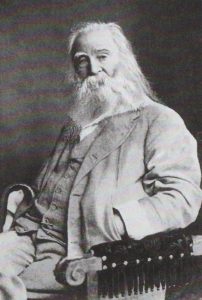
elections. While, like the editor of The Skibereen Eagle who was keeping a close eye on the doings of the Russian Tsar, I don’t think anything The Salvo could say would add to the total knowledge of this very weird election campaign. All I can say is, I just hope Harris wins. But as one chap said, ‘optimism of the will, pessimism of the intellect’…..
The Budget…you can’t be disappointed if you didn’t expect much
Here’s a piece I wrote for that great survivor of left-wing journalism, Chartist, a couple of weeks before Rachel Reeves’ budget. I can’t say it was ‘prescient’ as a lot of things had been trailed anyway. But I think I got it about right. This is very far from being a ‘green’ government. There were lots of things that Labour could have done e.g. around fuel duty, to name just one, but they chose not to – while jacking up bus fares. Clearly, investment in hospitals and schools is welcome. In many ways it was a classic ‘old Labour’ budget of ‘tax and spend’ with a nod to ‘the working man’ by cutting the price of a pint. How very quaint.
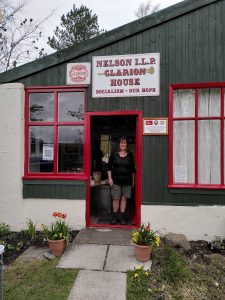
Many Salvo readers would have noted the wonderful news that the Bolton to Wigan line is to be electrified. I’m sure the people who have been working on the project for the last two years will be delighted. The completion of HS2 into Euston was widely expected but nothing about what happens north of Birmingham – something has got to be done, preferably ‘The Burnham Plan’ for a scaled-down but more appropriate option which provides for the capacity that’s desperately needed. So here’s what I said three weeks ago, with comments in brackets:
There’s a lot happening on the transport scene, good and bad, but first of all, hats off to transport secretary Louise Haigh for speaking her mind about the odious P and O shipping company, describing them as a ‘rogue operator’ . Let’s hope that Starmer doesn’t sack her for her temerity to say what even some Tory politicians said about the company that sacked 800 of its staff with zero notice.
It’s hard to say too much until Rachel Reeves’ budget measures are announced on October 30th. However, press leaks suggest that the go-ahead will be given to the completion of HS2 into Euston. Less has been said about what happens further north, with current plans, if you can call them that, involving HS2 finishing in a field north of Birmingham with trains crammed onto already congested tracks heading north. (still no news)
It’s essential that HS2 gets completed to Crewe, though not necessarily the over-specified scheme that was originally planned and contributed to some (not all) of the huge cost over-runs. The plans that are being promoted by the Greater Manchester and West Midland mayors, for a less expensive, but still fast, link from Manchester to Birmingham should also be given the green light.
Investment in infrastructure is key to economic growth and Reeves seems to get that (she seems to). The North of England suffers from particularly poor east-west links and proposals for ‘Northern Powerhouse Rail’ linking Liverpool, Manchester and Leeds also require unambiguous support backed up by cash. (all we got in the Budget were schemes already well advanced, do they think we’re a bit thick up North?)
Whilst the disputes with the rail unions have been settled (for now) there remains a huge number of cancellations particularly at weekends, due to lack of train crew. As argued in the last Chartist, getting Sunday to be part of the working week, is long overdue. Travelling by train on (state-owned) Northern on a Sunday has become a perilous venture.
It isn’t all about fast intercity connections. A lot of the animosity towards HS2 was fuelled by the appalling state of local train and bus services, particularly in the North. Much of the self-congratulation by Labour after its first 100 days was about structural changes they were introducing to nationalise the railway companies and to give local authorities powers to run, and own, the bus services. Which is fine as far as it goes. I’ve argued in this column over the years that public ownership in itself isn’t a magic wand that will make everything OK. As noted above, Northern is state-owned and has been for quite a while, but performance has got worse rather than better in recent months.
On the buses, Greater Manchester is an example of a successful publicly-controlled bus operation. Mayor Andy Burnham was a pioneer of route franchising (based on the long-established London model).
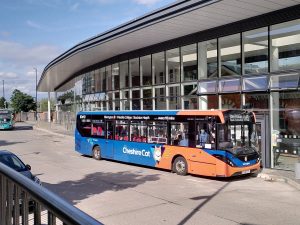
The first areas to get franchising were Bolton and Wigan and the results have been good, though perhaps not spectacular. Passenger numbers, and revenue, have gone up. Whether that increase will cover the extra costs of the re-organisation isn’t clear. But a bigger issue for bus networks generally is whether local authorities will have the resources to actually run their own services, at least on the level of current provision but really we need improved services and frequencies. Otherwise, what’s the point? The long years of cuts to local government spending have had a dire impact and councils are talking about having to make further cuts in spending. I find it hard to imagine any council thinking it would be a good idea to spend shedloads of money on running their own bus services when they’re having to close community centres, libraries and other vital services.(good that some extra funding was found in the Budget for bus services)
Most worryingly, the last Government’s £2 fare cap appears to be under threat. (It was cut! £3 outside London and Greater Manchester from next year). What sort of message would that send out about Labour’s commitment to helping those least well-off, addressing climate change and reducing car dependence? (draw your own conclusions…)
We keep being told about ‘difficult choices’ having to be made (Winter Fuel Allowance, ‘Pressiegate,’ perhaps the £2 fares cap, etc.) when it might be a good idea to make some not-all-that-difficult decisions such as scrapping some major road schemes that are in the pipeline, and increasing fuel tax. (typical Salveson optimism here…)
As things stand, I’m finding a huge amount of anger and disappointment out there towards Labour, amongst many people who
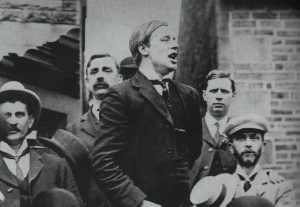
voted for them in the expectation that things would get better and – amongst transport activists – that we’d start to see a different approach to transport policy and investment decisions. There are things that Labour could do quickly, such as reforming criteria for infrastructure investment so that social, economic and environmental factors (rather than journey time savings) score highly.
I hope I’ll be pleasantly surprised by Rachel Reeves’ budget (I wasn’t), but I’m not holding out too much hope, even if Euston does get its new station. But that’s in London, innit?
Rocketing forward: Three year Heritage Lottery Funding Confirmed
Some great news about Rocket 2030, celebrating the 200th anniversary of the Liverpool and Manchester Railway. Here’s the press release which went out last week, from Manchester Histories:
£180,000 in National Lottery Heritage Funding Secured for the Rocket 2030 Partnership: Celebrating 200 Years of the World’s First Inter-City Railway between Liverpool and Manchester

To mark 200 years of the world’s first inter-city railway, Manchester Histories announce that the Rocket 2030 Partnership has secured just over £180,000 from The National Heritage Lottery Fund, alongside contributions from key partners, to celebrate the bicentennial of the Liverpool and Manchester Railway.
Helen Featherstone, Director, England, North at The National Lottery Heritage Fund, said: “The 200th anniversary of the world’s first inter-city passenger railway between Liverpool and Manchester in 2030 is a significant event in railway history. It is fantastic news that, thanks to National Lottery players, we are supporting important research and planning towards a series of heritage and cultural events for the future Rocket 2030 anniversary celebrations.”
This significant investment will lay the foundations for Manchester Histories and the Rocket 2030 Partnership to commission, develop and deliver a dynamic programme of events and community engagement activities from 2024 to 2027. The programme will forge connections between past, present and future and celebrate groundbreaking railway history and its lasting impact on heritage, culture, and communities across the North West. It will provide opportunities to thoughtfully address historical issues, such as labour exploitation during the industrial era and current challenges like climate crises.
This initiative draws inspiration from the original prospectus issued on October 29, 1824, which aimed to raise £300,000 for the railway. Manchester Histories will lead the project over the next three years, working alongside cultural organisations, local authorities, communities along the route, and key rail sector partners, including Network Rail

and Northern Rail. This inventive collaboration emphasises the critical role of skills and innovation in the North West. It aims to enhance the workforce development partnership, ensuring that the project contributes to the broader goals of economic growth and community empowerment.
Karen Shannon, CEO of Manchester Histories, said: “We are incredibly grateful to National Lottery players and The National Lottery Heritage Fund for their support in bringing Rocket 2030 to life. This project offers a once-in-a-lifetime opportunity to celebrate a major milestone in railway history while also addressing important contemporary issues like sustainability and community heritage.”
Laura Pye, Director of National Museums Liverpool, said: “National Museums Liverpool are delighted to be a key partner in the Rocket 2030 project, celebrating the ground-breaking legacy of the Liverpool
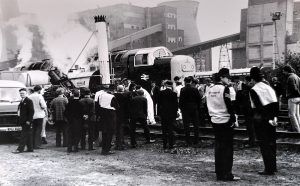
and Manchester Railway. This collaboration enables us to bring history to life in new and exciting ways while creating opportunities for people to engage with their heritage. Together, we’re honouring the past and shaping a more innovative and inclusive future.”
Key events and activities planned include:
- Preservation of Heritage: Rocket 2030 will explore the heritage of the Liverpool & Manchester Railway, addressing its architectural, cultural, and community significance. Key landmarks, including the Grade I listed Sankey Viaduct and Liverpool Road Station at the Science and Industry Museum, will be highlighted, alongside the railway’s impact on the region’s industrial development.
- Cultural Events and Activities: Rocket 2030 will deliver a series of cultural events, exhibitions, and artistic collaborations. This will include innovative projects such as contemporary historical animations and memorable moments in partnership with local artists to draw inspiration from the railway’s legacy and engage with current communities and audiences.
- Community Involvement: The project will actively involve local communities, particularly those along the railway route, in celebrating the railway’s legacy. Hamilton Davies Trust, working with the many partners, present and new, will continue to lead the further development of the existing Liverpool to Manchester CRP to empower local communities to actively preserve and promote their railway heritage, ensuring ongoing engagement beyond the project’s lifespan. Small grants will be available to support community-led heritage initiatives, fostering a sense of ownership and pride in local history.
- Economic Impact and Tourism: By partnering with the visitor economy sector, Rocket 2030 aims to create a significant heritage tourism offer that will attract national and international visitors, bolster local economies, and promote sustainable tourism.
- Educational Initiatives: Collaborations with local schools and universities to incorporate the railway’s history into educational programmes using new technologies, ensuring that younger generations are connected to their heritage.
- Sustainability and Innovation: Rocket 2030 will reflect on the past and address contemporary environmental challenges. The project will explore the railway’s role in shaping climate resilience and sustainable transport, with support from academic institutions and key rail industry partners.
Professor Paul Salveson, Chair of the Rocket 2030 Partnership, said: “The 200th anniversary of the world’s first inter-city railway is a great opportunity to celebrate our past as well as the importance of our railways in meeting the modern-day challenges of climate change and social inclusion. As a lifelong railwayman, I look forward to Rocket 2030 as truly inclusive, bringing together the people working on today’s railways and the communities they serve and support.”
As we look forward to the upcoming years, the Rocket 2030 Partnership is excited to embark on this journey of discovery, celebration, and community engagement. We invite everyone to join us in making this bicentennial celebration a landmark occasion honouring our past and inspiring future generations.
Phil James, North West route Director at Network Rail, said: “Rocket 2030 promises to be an incredible celebration of an iconic inter-city railway that provides a vital economic and cultural link between two much loved North West cities. We are proud to be custodians of this historic railway and continue to build on this incredible heritage in everything we do. From those pioneering days of steam travel, we now help millions of people travel between Manchester and Liverpool annually. We are grateful to the Heritage Lottery Fund for their support, and we look forward to working with communities on this initiative.”
For more information about the project, emerging details and upcoming events, keep in touch:
www.manchesterhistories.co.uk #ManchesterHistories #Rocket2030 #NationalLottery #HeritageFund facebook.com/manchesterhistories | instagram.com/manchesterhistories | x.com/mcrhistfest
About the Rocket 2030 Partnership
Rocket 2030 is an ambitious heritage project celebrating the 200th anniversary of the Liverpool and Manchester Railway. The project will highlight the historical significance of the world’s first inter-city railway and its ongoing impact on heritage, culture, and sustainability through a comprehensive programme of events, research, and community engagement.
The Rocket 2023 Partnership is Liverpool City Council/Culture Liverpool, Manchester City Council, Manchester Histories, Metal Culture, Liverpool, National Museums Liverpool, Network Rail, Northern Rail, Salford City Council, Science and Industry Museum, St Helens Council, Transport for Greater Manchester and The University of Liverpool. Hamilton Davies Trust and partners will continue developing the Community Railway Partnership (CRP).
www.manchesterhistories.co.uk facebook.com/manchesterhistories | instagram.com/manchesterhistories | x.com/mcrhistfest
Gorton Tank Rumbles On…
Some readers may be old enough to remember ‘Gorton Tank’ – the Great Central’s extensive loco works at Gorton, in East Manchester. For a trainspotter in Bolton it was quite special – near enough to get to cheaply but offering the sight of strange LNER – and older – locos. It was a bxxxxr to get round but you could spot quite a few locomotive

numbers from the long footbridge which went above the works and adjoining loco shed (‘The Birdcage’). On the other side of the tracks was the large Beyer-Peacock works which, in its time, built locomotives for all round the world – focusing on their highly distinctive Beyer-Garratt locos. I was a bit more lucky with the B-P works, being shown round by a friendly worker on his lunch break. The Western Region ‘Hymek’ diesels were rolling off the production line and I remember seeing D7034 outside, resplendent in two-tone green. That must have been August 1961, I was eight at the time.
Why am I rambling on? Well, I was invited to come along to a community event celebrating the end of a fascinating project about Gorton Tank and talk about how it all fitted in to the story of Manchester’s Railways. It was a ‘railway’ event like none other I’ve been to, with Chinese dancing, a choir and folk music, as well as recollections of Gorton in the 50s and 60s. It was organized by All FM, a local radio station. All credit to them – to find out more go to www.allfm.org/Gorton-Tank
Harry Pollitt at Gorton – a reluctant Stalinist?
One of my political heroes (I don’t have many) was Harry Pollitt, a working class lad born in Droylsden who went on to become General Secretary of the Communist Party of Great Britain. He had strong Gorton connections – he was apprenticed as a boilermaker at Gorton

Tank and returned as a ‘skilled man’ to work for a while at Beyer Peacock’s before the First World War. His ‘political apprenticeship’ was served at the Openshaw Socialist Hall on Margaret Street. I’ve been re-reading his autobiography, Serving My Time, published in 1940 and came across this:
“Early in 1914 I began to work at Beyer Peacock’s in Gorton as a plater in the Locomotive Shop, and we were very happy there. My father worked in the same shop and, as he was very popular, everyone made me very welcome in spite of the fact I was a foreigner ‘from the Tank.’ One would have imagined that the Tank was in darkest Africa, instead of being separated from Peacock’s only by the main railway line of the Great Central Railway, for there was great rivalry between Tank men and Peacock’s men, each believing they were the salt of the earth amongst boilermakers.”
Harry Pollitt became leader of the Communist Party in 1929, at the height of Stalin’s powers. Re-reading his autobiography he comes over as a warm and decent man, perhaps a reluctant Stalinist – though you

can understand why he made that choice to join the Communist Party when it was formed in 1920. I think the Independent Labour Party’s more woolly ‘ethical socialism’ would have lacked appeal – and the CP was very much the standard bearer for the Russian Revolution of 1917. His relationship with Moscow was difficult. There’s evidence that Pollitt intervened to try and save the lives of communists that had fallen foul of Stalin, including British communist Rose Cohen. She was shot as a spy. Pollitt himself was dismissed as general secretary in 1939 for opposing the Stalin-Hitler pact, but returned as leader when the Soviet Union joined Britain against the Nazis. I remember talking to Eddie Frow, the great bibliophile, historian and communist about Pollitt. Eddie always had great praise for him, which is good enough for me and told me a few tales which one day I’ll write up. Had the socialist movement not split after the First World War Pollitt could well have become the leader of a united socialist party – but it wasn’t to be. We’re still paying the price for that.
REPTA Remembered
A valued new addition to items on display at Kents Bank Station Library is the nameplate ‘REPTA 1893 – 1993′. It was carried by class 47 diesel lcomotive 47.156 until it was withdrawn. REPTA (originally the Railway Employees’ Privilege Ticket Association’) was a great

railway institution for decades, helping railway staff and their families with travel arrangements across the world. It finally closed at the end of 2023. Former trustees of the association travelled to Kents Bank to re-dedicate the nameplate and inspect some of the REPTA arcghive material we possess (more welcome!). Many thanks to former General Secretary Peter Davies for facilitating this (and sorry you had such an awful journey Peter!).
New winter exhibition showcases work of great local artists
The Beach Hut Gallery, on Kents Bank railway station, has launched a new exhibition showcasing the work of several outstanding artists based in the South Lakes.
The gallery is hosting original work by artists including Sally Toms, Christine Baines, Steve Trevillion, and Fionn Jordan Tatlock. They’re all very different but they share the fact they they’re very much of the area and are high quality.
Fran Brown, a director of the co-operative which runs the gallery, said

that there’s something in the exhibition to delight everyone. “There’s the vibrant ceramics of Sally Toms, intriguing collages by Steve Trevillion, superb landscape scenes by Chris Baines and highly intricate drawings by Fionn Jordan.”
A special viewing night attracted a capacity audience and Sally, Steve Trevillion and Fran Brown spoke about their work. The exhibition continues to the end of the year. As well as the current exhibition the gallery has exciting works of art by Martin Copley, Fran Brown, John Hatton, Steve Fairhurst, Ben McLeod (our previous featured artist) and many others.
The gallery opens every Friday, Saturday and Sunday from 11.00 to

16.00. It’s run on a not for profit basis and is staffed entirely by volunteers. It will be holding a Christmas Fair with its next-door-neighbours in the Station Library on Saturday December 14th between 11.00 and 16.00 with complimentary mince pies, mulled wine and other treats.
A ‘Friends of The Beach Hut Gallery’ was launched last month to generate support for the gallery and we’ve been delighted by the response. We think we’re offering something really special and we want to build our support in the community. Details are on our website or you can email us at beachhutgallery@googlemail.com for more.”
Railway Library – Network Rail to the rescue
The adjoining Railway Library & Bookshop continues to grow with many valuable donations. We were recently given some very important books by the Friends of the National Railway Museum – thank you Frank and Mike! The library and bookshop is now open the same days as the gallery – Friday, Saturday and Sunday, 11.00 to 16.00. However, we will continue to have ‘special’ days on the second Saturday of every month.
The only problem we have is space – we’re hoping to make better use

of the limited space we have and install some additional shelving. We’ve made good progress on that, thanks to Jon from Network Rail, part of the NR Employee Volunteering Scheme.
Our next ‘mutual improvement class’ will be on Wednesday November 13th. Peter Holmes will speak on ’Narrow-Gauge Industrial Railways of Furness’. Accommodation is limited so please book in advance, by email or ringing 07795 008691.
We have a large number of books for sale, mostly duplicates that have been donated. Pop round a pick up a bargain, some books from as

little as 50p. We have a small ‘overflow’ of good quality second hand railway books in the gallery but we want to focus more on art and local history/landscape. If you have any books you would like to donate to the gallery, please call in. We welcome bound magazines but not loose ones, of which we have a large pile which are free to good homes. Keep an eye out on www.stationlibrary.org.uk .
Finally, we are very dependent on a small team of volunteers to staff the gallery and library. If you’d like to help, maybe just a day a month, please get in touch. Training can be given and you’d be make a real difference. If you want to send anything by post our postal address: Station House, Kentsford Road, Kents Bank, Grange-over-Sands LA11 7BB
Railwaymen (and women!) remembered
The following personal accounts of railway life came out of an oral history class I taught, called ‘Railwaymen Remember’, for the University of Leeds in 1994. The class members were mostly retired drivers, a few former guards and signalmen and one remarkable lady, Eunice Bickerdyke, of Normanton. The stories were put together as ‘Messroom Gossip’, but were never published. I’m hoping to feature some of the stories in the next few issues of The Salvo. Hope you enjoy them!
LES JOHNSON
Les joined the railway in June 1937, starting on the LMS at Barnsley Court House as a Junior Clerk. He was refused by the LNER! Barnsley Court House was a joint station between the LMS and LNER and at the time of joining it came under the LNER’s jurisdiction. He was promoted into the Control Office and retired as a Deputy Chief Controller on 4th December 1952.
I can remember the evening trips to Belle Vue for 2/6, which included entrance into the place. These specials were highly popular, and I can
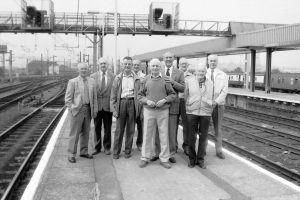
remember booking three or four thousand. We had to ring through to Mexborough for additional stock to cope with the crowds. I once booked two full fares, two halves, a pram and a dog, return to Wigan. A passenger at Normanton once asked me for two returns to ‘IMPSARSE’ I spent a few moments looking through the Station Index, before realising he wanted Ramsbottom.
I moved to Farm Buildings, Sheffield, the local headquarters. Once, after a night out with my girlfriend (later to become my wife), we missed the last train home to Barnsley. We had to get a lift on the Post Office van, arriving back at 3.35 on Sunday morning!
After a period on relief, I moved to Normanton and worked in the booking office, and also in the North Yard, assisting with Control number-taking. The night shift at Normanton was in two parts. The first was preparing tickets for issue on the first two trains to Leeds and
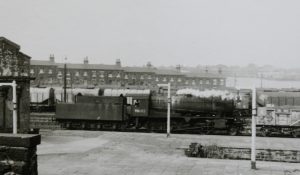
secondly sorting stacks of railway mail during the stay of two trains: the 02.55 Leeds – Bristol, which was in Normanton between 03.11 and 03.30, and the 02.05York – Liverpool, which was there from 02.36 to 03.09. Today, no trains of importance call at Normanton, and the station is just a small shadow of its former self.
At the outbreak of war I joined the railway section of the Local Defence Volunteers – later to become the Home Guard. I patrolled the centre of Barnsley armed with a brake stick! I joined the RAF in 1940, and was soon posted overseas to the Middle East. We were sent to North Luffenham for a medical check-up, and then granted leave. I arrived at Peterborough on Thursday around 10pm, and had a right set-to with the RTO, who said I’d have to wait until the following morning for the first connection to Barnsley from Sheffield. I managed to get to Doncaster, hoping to get a lift towards Barnsley – it was about midnight and I had my full kit with me. I met up with a sailor who was trying to get to Thurnscoe near Barnsley. He only had a side pack, so he carried my kitbag and we set off walking. He set a cracking pace and I had trouble keeping up. There was no traffic at all, because Hull was getting a right pasting from the bombers that night. As we approached Hickleton I asked what the hurry was. He replied “If I get home before t’pit buzzer blows, I’ll catch her!” I often wondered if he did. I was entering Goldthorpe when the first lorry I’d seen, appeared. I offered him two alternatives: either stop, or knock me down. He stopped. I arrived in Barnsley just before 6am and knocked my parents up. On the Sunday evening I left for West Kirby – so I had just 72 hours embarkation leave.
I spent four and a half years overseas. There were many memorable moments, but only one to do with railways. This was when I was in charge of a party on train guard, escorting two Maryland aircraft belonging to the Fleet Air Arm, from Aleppo in Turkey to Riyad in Egypt. It took 14 days. There was one quite extraordinary occurrence when I was in the Middle east. During 1941 I was on a bus between Tel Aviv and Haifa, in what was then Palestine. A civilian got on at Hadera, and sat just in front of me. He was speaking to his friend in the broadest South Yorkshire accent. I tapped him on the shoulder and asked ‘What part of South Yorkshire do you come from?’ ‘Barnsley’ he replied. ‘So do I – what’s your name?’ It was Jack Kendrick. ‘Do you have a sister called Renee and a father in the police force?’ I asked. Of course it was the same Jack Kendrick I had heard of! I ended up spending two days over Christmas with Jack and his wife. He was working for the Iraq Petroleum Company in Haifa. It was a coincidence meeting him like that, but the real nub of the story is this. I was telling the tale about how I met him on that bus one night when I was in Leeds Control. One of my colleagues, Norman Henfry, turned to me and asked ‘What did you say his sister’s name was?’ I told him it was Renee, and he said ‘She’s the girl my brother married!’ The next time I met Renee was at Norman’s funeral.
I returned to the railway in 1946. I got married and went to work in Cudworth Control. I had to spend quite a lot of time in Carlton Yards and in Carlton North Sidings Box to prepare me for the job. I moved on to Rotherham Control in 1947 when Cudworth, Staveley and Masborough Controls were amalgamated. I was promoted to Deputy Chief Controller in Leeds Control in September 1958. It was a good move, and I had applied for plenty other jobs without success before. I
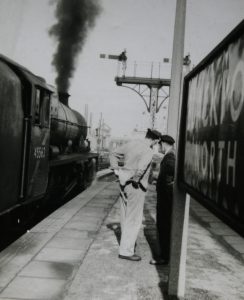
had an interview for a job in Doncaster, only to be turned down after the District Superintendent asked about my wartime work. When I asked him ‘What the hell has that to do with my railway capabilities?’ I was out on my ear! I didn’t shape any better when I applied for a job in Kings Cross Control, when I was working at Rotherham. They wanted to know what a ‘Midland’ man was doing applying for an Eastern Region job! I told them that Rotherham was part of the Eastern, but my lack of local knowledge told against me; I think they had someone lined up for the job.
For the Leeds job I was interviewed by a Mr Barlow, the District Superintendent. Now another job had also been advertised for the deputy in Wakefield Control, and I put in for that too. Mr Barlow said ‘I see you’ve applied for both Wakefield and Leeds – which do you want?’ I asked him if I had a choice. ‘I’ll re-phrase it then. If you had a choice, which would you want!’ I told him Leeds, because I knew Leeds and Wakefield were to be merged and I wanted to be in on the ground floor. I got Leeds, but it was 15 years before the two offices finally did merge.
The main job in Control was to deal with incidents quickly and efficiently when they occurred. I was involved in several major

incidents, including a derailment at Wath Road Junction of the St Pancras – Bradford express on 18th May 1948. I was Passenger Controller and was called out to deal with necessary diversions and other arrangements. The line was finally cleared at 07.35 on the 20th.
Another incident happened at Ardsley on 26th October 1959. I was a passenger on the 6.12pm from Kings Cross to Leeds Central with my wife and three children, when the train was derailed. My eldest son, Malcolm, was slightly injured. It was atrocious weather and the express hit a light engine. Although not on duty (a proper railwayman is never really off duty!), I checked with signalman Joe Ward that full protection had been carried out, and assisted on the ground until Stan Routledge, the District Inspector, arrived.
I was due to sign on at Leeds Control at 9.30pm on the night of 25th April 1960, but I arrived early at 9.10pm. My colleague, Harold Johnson was sat very intently on the end of the phone. I asked what was wrong. ‘We’re waiting for a bang’ he replied. He knew an incident

was about to occur and there was nothing we could do about it. Sure enough, a crash happened between Garforth and Micklefield. My experience of the Ardsley accident made me fully aware of the feelings of people involved in such incidents, especially the need for ‘a nice cup of tea.’ I made sure all the passengers were well looked after.
There were plenty other incidents I had to deal with, including the collision at Bradford Exchange on 3rd June 1964 when a Manchester – Leeds passenger train ran into a stationary parcels train. The St Pancras to Edinburgh sleeper was derailed at Rothwell Haigh on the night of 27th September 1964. I was called out to take charge of the Control Office.
A very sad incident happened at Kirkstall on 17th July 1970 when an empty stock working from Keighley to Leeds ran into the rear of the 16.57 Workington to Tinsley freight. The goods guard, T. Telford of Skipton, was killed. I had the unenviable job of ringing up his brother Jack Telford, who worked in our Control, to tell him the bad news, and to arrange for him to attend for identification of the body.
I was involved in sorting out the mess after the 21.50 York – Shrewsbury collided with the 20.40 Liverpool – Hull at Farnley Junction on 5th September 1977, and also the crash at Dearne Valley Sidings on 19th June 1978, when a freight became derailed, and was then struck by the 14.36 Paignton to Leeds express. That was real railway work, sorting that lot out.
Lancastrians: Mills, Mines and Minarets
I’m still getting invited to do talks on my ‘Lancastrians’ book. I’ve done several during the Autumn including Chorley Family History Society and Probus clubs in Preston and Leyland (actually on Walt Whitman’s Lancashire links, which feature in the book).
The book itself isn’t a ‘conventional’ history and covers different themes of Lancashire history, including sport, culture, politics, industry  and religion. It explores the Lancastrians who left for new lives in America, Canada, Russia and South Africa, as well as the ‘New Lancastrians’ who have settled in the county since the 14th century. There are about forty ‘potted biographies’ of men and women who have made important (but often neglected) contributions to Lancashire.
and religion. It explores the Lancastrians who left for new lives in America, Canada, Russia and South Africa, as well as the ‘New Lancastrians’ who have settled in the county since the 14th century. There are about forty ‘potted biographies’ of men and women who have made important (but often neglected) contributions to Lancashire.
The book is hardback, price £25. Salvo readers can get it post free directly from me
Feedback and blowdowns
Geraint Hughes: Full marks for your comment that we need to preserve elements of local or regional identity in whatever emerges under the GBR banner. There’s a danger that a fully national organisation will just sink to the level of the lowest common denominator, rather than seeking to emulate the best operators of the current crop, from whom there’s a lot to learn. Where I live in East Anglia we have Greater Anglia, who are top of the tree, with customer-focused staff, new trains and a strong community connection, but we also have Govia Thameslink, who are largely anonymous and poor performing. It’s interesting that the latter have been on a cost-based contract with DfT for some years, with little incentive to grow revenue and the customer base. Fingers crossed that GA will persist in some form!
Conrad Nazio: Trams and drink: you should surely have heard this one, a favourite of my mother’s: Man thrown out of pub: “Get oop! say his mates. “I can’t, me nose is stuck in t’tram lines”. So they upped wi’ his heels, and wheeled him to t’depot”.
Farewells
Very sadly, the death has occurred of Nancy Cameron, beloved wife of Dugald and founder of the award-winning Friends of Wemyss Bay Station, just days after it won Best Small Station at this year’s National Rail Awards. Our deepest sympathies to Dugald.
Malcolm Bulpitt, long-time Swiss Railways fan and editor of Swiss Express, has died. He worked in local governmenta nd was a highly regarded transport planner – and a regular reader of The Salvo.
Robin Cole, dearly loved partner of Polly, died at home in Glasgow earlier this year. He was an amazing character and his funeral service had no shortage of wonderful tales of his doings. We shall not see his like again.
and greetings
Birthday greetings to Lucy (grand-daughter) who insisted on showing

me this great artwork at Stockport Edgeley station. Well, I said I’d take her to the Bahamas for her birthday. The artwork at the back of the station is well worth looking at – well done Avanti and community rail aprtners for making the approach to the station something really special.
Congratulations to Michael Davies, Ffestiniog pioneer, explorer of the

Irish narrow-gauge and much more, on reaching his 90th. We had a delayed, but very enjoyable, outing to West Yorkshire in October which took in trains and scenic bus journeys. The route was Kents Bank – Preston – Blackburn – Todmorden – bus to Lumbutts – lunch – walk down to Tod – bus to Hebden Bridge – bus ‘over the tops’ to Keighley – train to Gargrave – pub – train to Carnforth and back to Kents Bank. I was tired out, Michael could have kept going….Hwyl fawr!
Still in Print (at special prices)
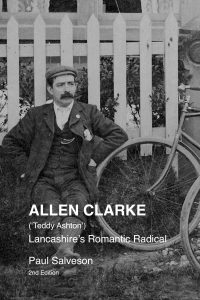 ALLEN CLARKE: Lancashire’s Romantic Radical: a biography of the remarkable Aleln Clarke/Teddy Ashton: dialectw riter, cyclist, socialist, philosopher – and more. £5.99 (normally £18.99)
ALLEN CLARKE: Lancashire’s Romantic Radical: a biography of the remarkable Aleln Clarke/Teddy Ashton: dialectw riter, cyclist, socialist, philosopher – and more. £5.99 (normally £18.99)
Moorlands, Memories and Reflections A series of essays on aspects of Allen Clark’e 1920 classic Moorlands and Memories, bringing the story up to date. £15.00 (£21.00)
Last Train from Blackstock Junction (published by Platform 5 Books). A collection of short stories about railway life in the North of England. Salvo readers can get the book at a specially discounted price, courtesy of Platform 5 Publishing. Go to https://www.platform5.com/Catalogue/New-Titles. Enter LAST22 in the promotional code box at the basket and this will reduce the unit price from £12.95 to £10.95.
The Settle-Carlisle Railway a general history of the famous line, with an emphasis on the people who built and worked on it. (published by Crowood £24) – can do it for Salvo readers at £12
See www.lancashireloominary.co.uk for full details of the books (ignore the prices shown and use the above – add total of £3 per order for post and packing in UK)
WITH WALT WHITMAN IN BOLTON
This has been out of print for a few months but I’m doing a new
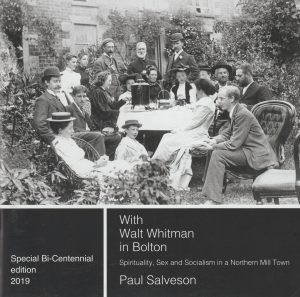
edition, only very slightly revised an updated. It will be available from late November, price £12 (including postage). Salvo readers can email orders through.
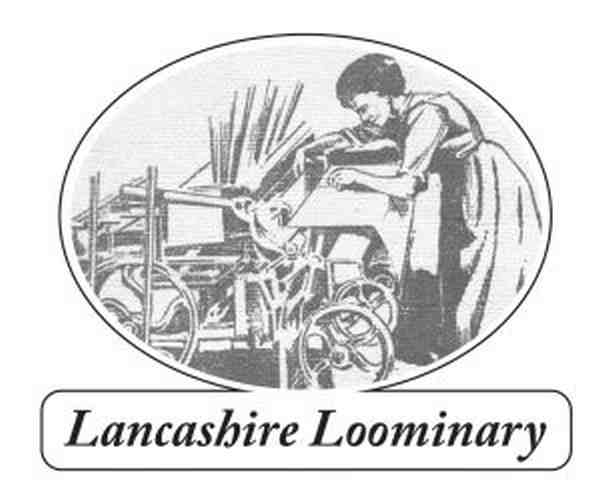
4 replies on “Northern Salvo 323”
Hideous news from the USA makes any comment on issue 323 meaningless.
Great rundown on the rail scene and much more.The key event is clearly the celebration of the Manchester-Liverpool Raikway. That’s fine but I have always wondered how Secretary of Trade Huskisson managed to get himself run over (proved fatal) in the middle of this first run, and not even the Duke of Wellington (present) couid save him. How will this disaster be acknowledged – the train was only going at 20 mph I believe ?!
Will your new Partnership put a rocket up Huw Merriman?
Tomorrow’s CILT event ,ay be of interest
: Tuesday 19 November 2024
(1745 for 1800)
Venue: Online Webinar
Topic & Speaker: “Sharing our past, building our future. Blair Atholl station heritage” by Dr Viv Cree, chair of the Friends of Blair Atholl Station
Long gone are the days when the wayside station at Blair Atholl, at the foot of the climb to Britain’s highest mainline railway summit on the Highland Main Line, had staff living in its house and a private waiting room for the Duke of Atholl whose nearby seat is the home of Britain’s only private army. Yet trains still call, including the Caledonian Sleeper, and the station with its fine semaphore signalling continues to play a key role in the community. On relocating from academic life in Edinburgh, Dr Viv Cree determined to restore its self-confidence and quickly secured funding from the Heritage Lottery. Here she tells us how she has set about rediscovering Blair Atholl Station’s distinctive heritage.
Cost & Booking: Members: Free; Non-Members: £5.00. Booking through Corby is required.
Click at http://www.ciltscotland.com to book online